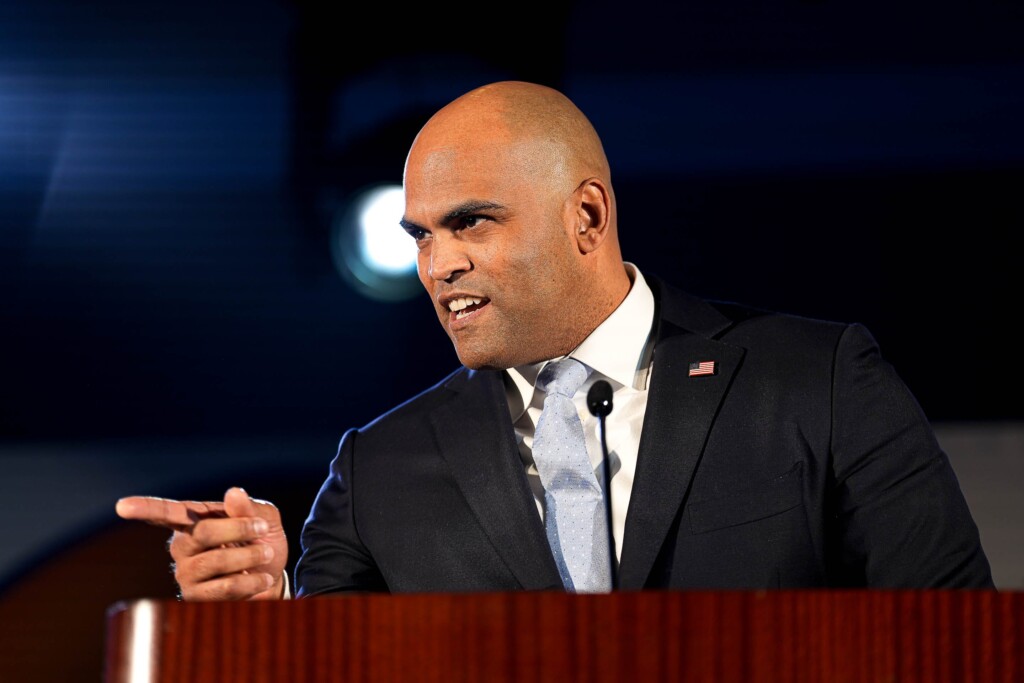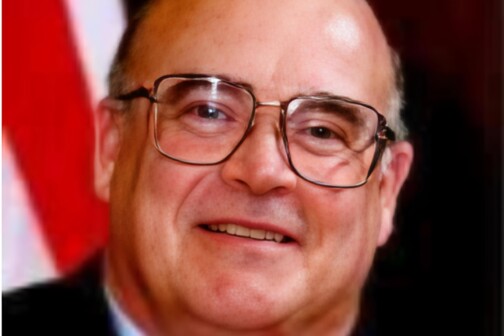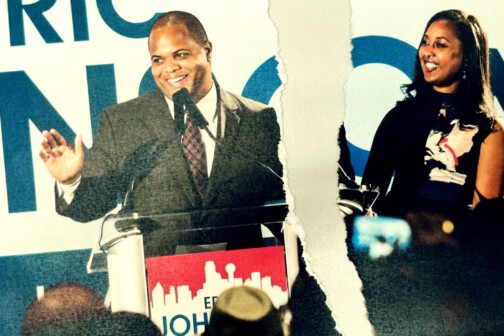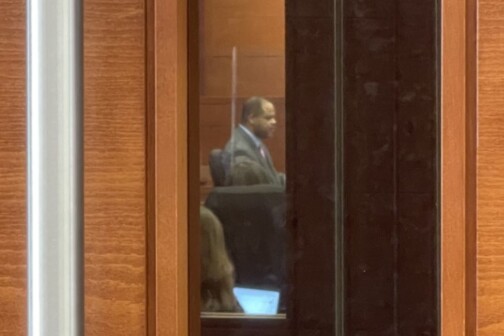Depending on the poll, Colin Allred is either the 6-point underdog in his U.S. Senate race against incumbent Republican Ted Cruz, or he’s neck and neck.
The attorney and former NFL player has been here before, he argues. In 2018, he bested incumbent Pete Sessions for the District 32 congressional seat. Sessions had been in Congress since 1997, first in District 5, and moving to the then newly created D-32 in 2003. When Allred kicked off his campaign to represent his hometown, Sessions was one of the most powerful Republican members of Congress, running the National Republican Congressional Committee for two successive campaign seasons and leading the House Rules Committee.
Sessions was expected to win, as usual. (He drew 71 percent of the vote in the 2016 election, and Allred had to escape a runoff election with Lillian Salerno in the 2018 Democratic primary.) Instead, Allred would beat Sessions, 52.2 percent to 45.9 percent.
“You believed in us when all the pundits didn’t, when the experts said it wasn’t possible,” Allred told his watch party gathered at Dallas’ Magnolia Hotel Park Cities that night.
Last May, Allred announced his candidacy for Senate with a video that highlighted some of Cruz’s actions in the past couple of years, including the junior senator’s infamous flight to Cancun while most of the state sat in the cold thanks to power outages from Winter Storm Uri.
“We don’t have to be embarrassed by our senator,” he said. “We can get a new one.”
In the March Democratic primary, he faced eight opponents, including state Sen. Roland Gutierrez and state Rep. Carl Sherman. Allred avoided a runoff with 60 percent of the vote, placing him directly in the path of Cruz in November. The last time the Democrats won a statewide race was 30 years ago, in 1994, when Bob Bullock won the lieutenant governor seat with 61 percent of the vote.
Last week, just days after President Joe Biden told Dallas supporters to “elect Colin your next senator,” Allred sat down for a quick chat about his campaign so far. Our conversation, edited for length and clarity, is below.
You have some experience against a seemingly entrenched GOP incumbent, but what’s different about this race, besides the fact that it’s a statewide race?
I feel similarly about this race, but also the stakes. In 2018, it was a really critically important time, and the community I knew and was born and raised in wasn’t being reflected in the leadership that we had. As it turned out, Texans agreed with me, and voted to unseat the 22-year incumbent.
And in this case, I feel the state that I know, and that I was born and raised in, is not reflected by the senator that we have in place. I think that we’ll see enough Texans who will agree with that. The stakes are incredibly high in this election, and it’s taking place at a time when we can’t afford six more years of Ted Cruz in the Senate. Our freedoms are under attack; we’re going to restore those freedoms. The story of success that we’ve experienced as Texans is being put at risk by extremist politicians like Ted Cruz. We have to send a strong message that this is not who we are, and I think we will.
Ted Cruz writes books, hosts a podcast, and is on news shows frequently. He’s also known—and this goes back to your very first campaign video—for his flight to Cancun during the winter storm, and his support for Trump. How do you think voters perceive the difference in your work styles?
One thing I’ve learned in my time in Congress is that there are the workhorses and the show horses. The workhorses are the ones who are trying to do the hard work of rolling up your sleeves and finding compromise and pass legislation that will help your constituents in your community. And then there are people like Ted Cruz, who are only concerned with getting in front of cameras or doing podcasts three times a week, or choosing and diving into the most divisive issues possible—nothing that will actually better anyone.
We have to have a serious senator who, when we have an important piece of legislation like the Chips and Science Act, recognizes that Texas is going to benefit from this act more from than any other state. We have Texas Instruments building a (semiconductor wafer) fab in Sherman, and Samsung building outside of Austin. We’re going to benefit from this bill, and John Cornyn is voting for it. Cruz votes against it, and the only reason he does that, I think, is because of the politics.
Or we have a crisis at the border, and we see we had a record number of crossings in December as a bipartisan bill to try to rush billions of dollars to Texas specifically for additional CBP agents, for immigration judges, for administrative staff to help with asylum cases, and to change the process itself. He takes that down, not because of the policy, but because of the politics.
We are not in a moment where we can have an unserious senator anymore. I have a very different record of doing everything I can to find that compromise, knowing we’re not going to get everything we want. But you know, that’s how we open a VA hospital in Garland, working with the Trump administration and local Republicans. That’s how we pass the US-Mexico-Canada trade agreement during the Trump administration, and only pass it because Democrats like me pushed forward. We’re the biggest beneficiary of that with our trade with Mexico and Canada. There’s the infrastructure bill, the Chips and Science—in almost all these cases Cruz wasn’t involved, or he voted against them. I think he has to be held accountable for that.
You’re seen as a left-leaning centrist. But we also live in a world where you have people on both ends of the spectrum who will never be happy with that position. How do you broach that with them?
When you’re raised by a single mom, I think you just don’t really have the patience for theoretical ideas that are never going to help anybody. I think about my mom, and the way I grew up, and I think about the single moms and other parents out there who are working two or three jobs, and I think they’re probably hoping their elected officials are working as hard as they are, and that they’re not just trying to advance themselves. I don’t really have much patience for folks on the left or the right who spend their time getting bogged down in ideological battles. That won’t help anybody.
But that’s not to say we don’t have some important battles that we do have to have. What’s happening regarding reproductive rights and access to abortion in Texas is a disaster and a tragedy. We are going to be experiencing all the downstream impacts of this for years to come unless we address this—from our universities having their enrollment altered to our medical schools being impacted, to business leaders having a harder time recruiting and retaining top talent. It’s a massive issue for us. There are some fights that we’re gonna have to have, but to me, we can’t only fight, we have to also try to get things done.
Things have gotten very partisan in Congress, and there seems to be a lot of political pressure to strictly align with your party. Do you see opportunities to work with John Cornyn if you’re elected?
I am very confident that John Cornyn and I will work well together—and I’m sure that I’m not doing him any favors by saying that. But I’m very confident that, based on our history of already working well together on legislation like the Safer Communities Act, which was the first time in 30 years we’ve done something to address gun violence after the tragedy in Uvalde, or the Chips and Science Act. I know that he wants to have a comprehensive approach to reforming the immigration system, and I do as well. I’m very confident that we will be able to have that compromise and to actually look out for Texas in a way that I have not seen Cruz engage in. I built a record of working well with incredibly conservative colleagues of mine here in North Texas … and I anticipate that being the same or even more so in the Senate, versus Ted Cruz who is proudly one of the most hyper-partisan senators in the country. The choice will be incredibly stark here.
Do you think there is a certain amount of fatigue setting in with constituents in terms of this hyperpartisanship?
I do. I think Texans go to work every day with folks who they disagree with, and they have to find a way to still get things done. And I think they are increasingly frustrated—rightfully so—with this. We only passed 27 bills all last year because of hyper-partisanship. That means, for a state of 30 million people and a country of 350 million people, we are unable to respond to the basic needs of folks. And to me, this is something that cannot continue.
We are also putting at risk our position as leader of the free world. By not supporting Ukraine and Taiwan and democracies that are at risk around the world, we’re putting at risk the idea that democracy itself works. Autocrats and dictators are using our dysfunction to argue in their own countries that this is why democracy doesn’t work. This is larger than just our own problems in this moment. History is watching, and we have to have a response.
Author







